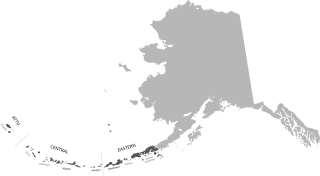
Back Алеут бызшәа AB Idioma aleutiano AN اللغة الأليوطية Arabic Idioma aleutianu AST Aleut dili AZ Алеуцкая мова BE আলেউট ভাষা Bengali/Bangla Aleuta Catalan Aleutština Czech Aleutische Sprache German
| Aleut | |
|---|---|
| Unangam Tunuu Уна́ӈам тунуу́/унаӈан умсуу | |
| Pronunciation | [uˈnaŋam tuˈnuː] |
| Native to | Alaska (Aleutian, Pribilof Islands, Alaskan Peninsula west of Stepovak Bay), Kamchatka Krai (Commander Islands) |
| Ethnicity | 7,234 Aleut |
Native speakers | <80 in Alaska (2022)[1] extinct in Russia 2021 |
Eskaleut
| |
Early form | |
| Latin (Alaska) Cyrillic (Alaska, Russia) | |
| Official status | |
Official language in | |
| Language codes | |
| ISO 639-2 | ale |
| ISO 639-3 | ale |
| Glottolog | aleu1260 |
| ELP | Aleut |
 Aleut is spoken on the Aleutian Islands | |
 Aleut is classified as Critically Endangered by the UNESCO Atlas of the World's Languages in Danger | |
| Person | Unangax̂ |
|---|---|
| People | Unangan (east) Unangas (west) |
| Language | Unangam Tunuu |
| Country | Unangam Tanangin |
Aleut (/ˈæliuːt/ AL-ee-oot) or Unangam Tunuu[3] is the language spoken by the Aleut living in the Aleutian Islands, Pribilof Islands, Commander Islands, and the Alaska Peninsula (in Aleut Alaxsxa, the origin of the state name Alaska).[4] Aleut is the sole language in the Aleut branch of the Eskimo–Aleut language family. The Aleut language consists of three dialects, including Unalaska (Eastern Aleut), Atka/Atkan (Atka Aleut), and Attu/Attuan (Western Aleut, now extinct).[4]

Various sources estimate there are fewer than 100 to 150 remaining active Aleut speakers.[5][6][7] Because of this, Eastern and Atkan Aleut are classified as "critically endangered and extinct"[8] and have an Expanded Graded Intergenerational Disruption Scale (EGIDS) rating of 7.[9] The task of revitalizing Aleut has largely been left to local government and community organizations. The overwhelming majority of schools in the historically Aleut-speaking regions lack any language/culture courses in their curriculum, and those that do fail to produce fluent or even proficient speakers.[10]
- ^ "How Many Speakers are There of Each Alaska Native Language?".
- ^ "Alaska State Legislature".
- ^ Bergsland 1994
- ^ a b Bergsland 1997
- ^ "Unangam Tunuu (The Aleut Language) Preservation". Aleutian Pribilof Islands Association. Archived from the original on February 24, 2013. Retrieved March 16, 2013.
- ^ "Aleut". Alaska Native Language Center. Archived from the original on 2018-01-23. Retrieved 2013-03-16.
- ^ "Alaska Native Languages: Population and Speaker Statistics". Alaska Native Language Center, University of Alaska Fairbanks. Archived from the original on 30 July 2018. Retrieved 23 January 2018.
- ^ "UNESCO Atlas of the World's Languages in Danger". UNESCO. Retrieved 23 January 2018.
- ^ "Aleut". Ethnologue. Retrieved 23 January 2018.
- ^ "Sealaska Heritage Institute: Alaska Native Language Programs, January 2012". The Alaska State Legislature. Retrieved 23 January 2018.